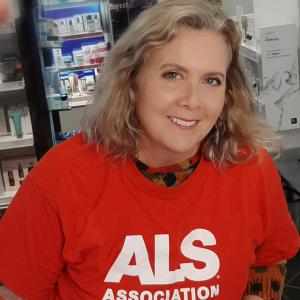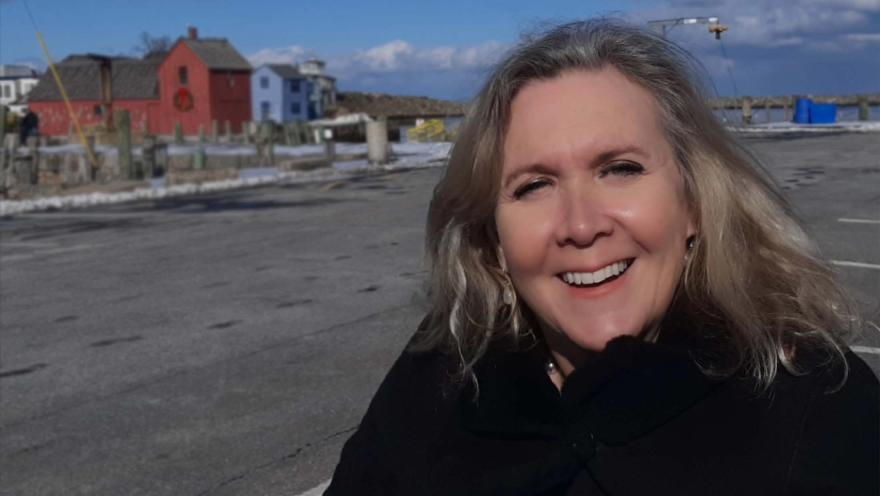By Dr. Heidi Tarr Henson
Heidi Tarr Henson, diagnosed with ALS last spring, shares thoughts about her personal journey living with the disease, what courage means to her and how she strives every day to embrace and live by this powerful virtue.
Since my diagnosis, I’ve been working on a memoir of sorts. Nothing too comprehensive, more like a hundred-page tale of some of the things I regret, and some of the times that brought me joy. It’s a fairly common thing for those of us with a fatal diagnosis, a metaphorical gun to our head, to want to capture the reflections that pass through our minds now that we know our time is limited. We naturally want to record memories when we aren’t likely to be able to make many more.
I’ve read a lot of these dying memoirs. So much so that in the second paragraph of my draft, I say that I don’t want this to be another “I’m dying” memoir. Every time I start reading one of those, the first thing I do is google the person and see if they are dead yet. If so, when did they die? Maybe they haven’t died yet? It’s disheartening when you find their obituary and injects a shot of hope when you don’t. So, get it out of the way, I say to my reader. Google me now.
If you find an obituary, I add, you should know I wrote it within a month of diagnosis. Morbid maybe but getting my ducks in a row gave me some illusion of control. No guarantee my family used that version, however. If they rewrote the obituary, it better not have the term “courageous battle” in it. That term incenses me for some reason. Are we supposed to compliment the dead for their dying process? They were courageous rather than wimpy in the face of their demise? Hmm. And I don’t want any adjectives like “valiant” either. I am not Washington crossing the Delaware, just another person who had the misfortune to have a fatal disease. If someone sticks those words in my obituary, I’m going to be really mad. I may have to haunt someone.
Suffice it to say, by the time someone reads my memoir, I am either dead or I’m not.
Despite not liking “courageous battle,” the concept of courage is one I embrace, and feel called to act on every day I am still alive. Courage has always been one of my favorite virtues, along with truth, kindness, and empathy. What constitutes courage varies with the person. Some see it as fearlessness. Others grit. Often, it’s bravery. I see courage as the ability to do something difficult. To go into a dark unknown, whether it’s confronting someone, trying something new, or just making it through one more difficult day. In my struggle to live with a debilitating disease, I find courage shows itself in the small moments. When I’m trying to get off the toilet or into bed and my arms just won’t support the transfer. I exhort them, “come on!”, but they just don’t have it in them, and sometimes I’ve slid to the floor. I have to wait for someone to hear my call, and then hope we can get me off the floor, or at least dragged to a more comfortable position.
This takes courage. To not just lie there and say screw this I’m not doing this anymore.
It takes courage to wake up every morning when you have ALS. To wonder if you will see a change in yourself that day. It takes courage to get up knowing you will never get better. You are only going to get worse.
I’ve found my courage ignited by my desire to be a positive sick person. Someone who isn’t sharp or angry, someone who is patient, who people still like to be around. This takes courage when you don’t feel well. When someone asks you how you are, and you’re not good, it can take courage to be honest AND it can likewise take courage to resist the temptation to be brutally honest. It gets you both ways, because no matter what you say, others react, and those reactions are sometimes hard to manage. I struggle to have the bandwidth to be there for others right now. Every day I reflect on the courage it takes to stay alive for my family. Some days it feels like that is what I’m doing. I don’t want to continue living in this diminishing capacity, but I don’t want to put my family through that grief any sooner than I will have to.
As a pALS friend said to me recently “So many days I think I’m done, then my 5 grandchildren come over…”
One of courage’s finer moments comes whenever I go out in public, because I will inevitably be stared at, often with that mime face of pity. I know how much that bothers me, and I struggle to ignore it and go on with my day. When I manage to get out, I will worry about getting into the destination, through the spaces there, and also worry that I will have to use the restroom, which will be hard. I’m usually concerned about running into people I know, as I don’t want to be asked “What’s wrong?” when they see my wheelchair. If they know already, I don’t want to have a conversation about how my illness is going because for these brief moments, out to lunch, or on a scooter walk, I try to forget I have one.
For many years I taught a graduate course in Adult Transitions, based on the work of Nancy Schlossberg. An event or condition is a transition if it affects our roles, routines, relationships and responsibilities. We are all always in transition of some kind, from positive social milestones, like getting married or retiring, to unexpected ones like having a serious injury or winning the lottery. Sleeper transitions are ones that happen over time, like losing significant weight, or falling out of love. In my course materials, I listed the major types of transitions, as well as tips for managing them, which all require taking stock of yourself, the situation, what supports you have and the strategies you will use. The one example that all my students commented on was the sleeper transition of “waiting to die.” They didn’t like the harshness of it, and often didn’t know what it meant- don’t you just die? I’d explain that it can be a process. I haven’t taught this course in years but the “waiting to die” transition looms large in my mind now. It takes courage to wait to die, and to make the most of it while you are waiting.
There are lots of sources on how to become courageous. Most strategies build off the need to conquer your fears by first identifying them and then through either slow desensitization or in one fell swoop, doing the things you thought you couldn’t do. Once done, this builds confidence in your ability to do more.
We can also build confidence by assessing our strengths. When we identify what we are good at and where we have been successful in life, we can remind ourselves that we’ve managed challenges before, and we can do so again. This takes on new meaning when you have ALS. Who you are physically is changing, and it’s hard when you don’t feel like the same person to remind yourself that you are still someone with talents, experience and past successes. That while physically your abilities are diminishing, you can draw on these past accomplishments to develop resilience and fortitude to still get things done.
I think those of us living with ALS don’t need to seek ways to build the courage muscle. We are getting a crash course in it every day. Courage is found in accepting that you have the disease, and in accepting what it is doing to you. Acceptance isn’t necessarily peace with it, just like to forgive someone doesn’t mean you forget what they did. Forgiveness is a gift you give yourself because it allows you to move on. Acceptance is the same. You need to be able to move forward if you are going to keep living. One foot, or thought, in front of the other. Acceptance fuels that.
Courage is found in trusting yourself to handle what is happening to you, and in asking for help to get you through it. Knowing when to ask for help means you are being honest with yourself about where you are at, and the limitations you are facing. You identify them and develop strategies to meet them. That takes courage.
Some days courage is just getting out of bed or your chair. So, if you have done that today, I salute you. You have fought a courageous battle.
Special thanks to Heidi Tarr Henson for sharing more about her personal journey living with ALS. To continue to follow stories about people living with ALS in the community and learn more about the disease, follow our blog at als.org/blog.

Heidi Tarr Henson has served as a vice president of human resources at several institutions, as well as an MEd/MBA professor teaching graduate courses in human resources, organizational behavior and business communication. She also owns a coaching and consulting business.
Dr. Henson holds a BA from Boston College, an MA from Harvard and a doctorate in leadership and adult development from Drake. Her doctoral dissertation addresses how diversity training can create attitudinal change, and this research was published as an ASTD case study. Some of her consulting clients have included Principal Financial Group, Ford Motor Co., Iowa Health Systems, Cell Signaling Technology and Northeast Health Systems. She also published a life transitions guide in 2011.
Heidi was diagnosed in May 2021. A native of Cape Ann, Massachusetts, she struggles with giving up her long-term passions of ocean rowing and dancing to live music and has been re-discovering old ones like writing and watercolor painting. She can be reached at heidichannel@comcast.net.


Comments
Strong woman I haven’t seen in decades. Her words provide strength as my wife of 50 years faces stage IV NASH Cirrhosis and I an inoperable severe stenosis in my brain. She will be welcomed in heaven.
Join the conversation. Please comment below.